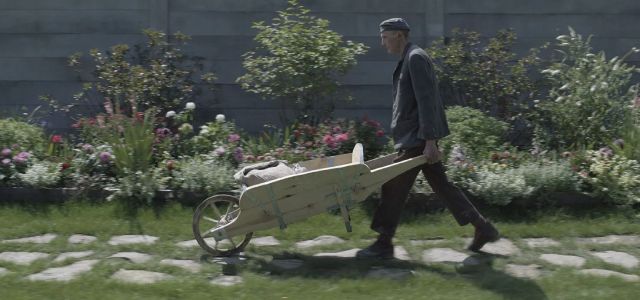Winner of the Cannes Grand Prix in 2023 and crowned with 2 Oscars (Best International Film and Best Sound), Jonathan Glazer’s Zone of Interest stands out as a shocking film about the Shoah, as confusing and exciting. The director makes a bold bet here to never show the horrors of the camps head-on, an approach that is shameful and has led to backlash.
Inspired by the novel by Martin Amis, the film immerses us in the chillingly ordinary life of the family of Auschwitz commander Rudolf Höss, a seemingly peaceful life in the heart of one of history’s most horrific places.
Life in the Shadow of Auschwitz
The contrast from the first pictures is striking. The area of interest opens with an idyllic scene of children playing in the grass and a family swimming in the river in the sun.
What appears to be a banal scene of marital bliss quickly takes a disturbing turn. Metallic sounds and piercing screams can be heard in the background, indicating the proximity of the Auschwitz camp. Through this sweeping soundscape, Glaser recalls a barbarism that is always present but never directly displayed.
This is the entire device of the film: it relegates the horrors of the camps to the background, off-camera, to concentrate on Hoss’s almost trivial day-to-day life. Rudolph and his wife Hedwig live in a comfortable house near the camp, where they raise their children, have family dinners and cultivate a lush garden, which Hedwig calls “paradise”.
The contrast between this apparently normal domestic life and the monstrosity of the actions taking place a few meters away causes constant discomfort, even surprise, in the viewer.
invisible violence
The film plays with the absence of shocking images to better capture the horror. Because the violence of the camp is suggested by sound: the cries of the prisoners, the sirens, the trucks that turn day and night. This process makes the film more disturbing.
It suggests that horror is never spectacular, transforming every moment of banality into something deeply disturbing. In this way, the viewer is invited to imagine the unspeakable.
Jonathan Glazer never falls into the trap of sensationalism. He refuses any over-dramatization, which makes his film more disturbing in its wake. There is no heroic protagonist or emotional catharsis.
The screen is dominated only by the dehumanized coldness of the characters – especially Hedwig, played by Sandra Huler, once again incredible. In a chilling scene, she threatens one of the servants, reminding her that her life could be destroyed by a single word from her husband.

A controversial approach, but a necessary film
Glazer’s choice to focus the plot on the executioners and make the victims almost invisible has sparked heated debate. Some critics, particularly in the United States, found the film immoral and called its approach “kitsch” or “a hollow artistic exercise”.
However, the film was also praised for its approach to such a difficult subject. By avoiding direct depictions of violence, Glaser forces viewers to challenge their own perceptions and limitations in the face of horror.
Zone of Interest is not a simple film. It doesn’t try to offer answers or comfort in the face of the unthinkable. By choosing to show the banality of evil through the prism of the daily lives of the oppressors, Jonathan Glaser creates a deeply disturbing work, bordering on the bearable, that provokes difficult moral reflection.
As minimalist as it is powerful, this film is sure to leave a lasting impression and will continue to spark debate for a long time to come.
It is an essential film in approaching the Shoah from a new angle, respecting absolute modesty. A true cinematic tour that puts the audience in front of their own emotions and questions.
Zone of Interest, tonight at 9pm on Canal+
Source: Allocine
Rose James is a Gossipify movie and series reviewer known for her in-depth analysis and unique perspective on the latest releases. With a background in film studies, she provides engaging and informative reviews, and keeps readers up to date with industry trends and emerging talents.


![TOMORROW BELONGS TO US IN ADVANCE: THE PHILIPPINES WILL DO EVERYTHING TO PROTECT CHARLES… WHAT’S AHEAD OCTOBER 27 TO OCTOBER 31, 2025 [SPOILERS] TOMORROW BELONGS TO US IN ADVANCE: THE PHILIPPINES WILL DO EVERYTHING TO PROTECT CHARLES… WHAT’S AHEAD OCTOBER 27 TO OCTOBER 31, 2025 [SPOILERS]](https://fr.web.img6.acsta.net/img/b2/7f/b27f5a3fbc55d29b821eff36e2cd8a48.jpg)


-soq6i9m0ttgh.jpg)

